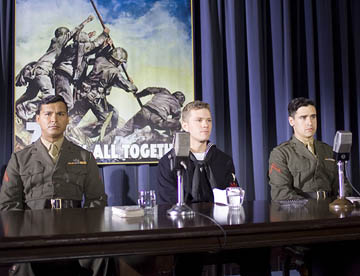
As its conceit, the film follows the six soldiers pictured in the famous photograph of the Iwo Jima flag-raising, of which only three made it out alive: John “Doc” Bradley (Ryan Phillipe, better than usual), Rene Gagnon (Jesse Bradford), and Ira Hayes (Adam Beach, also very good). As it turns out, surviving hell on earth was only the first of their trials: Once the federal agitprop powers-that-be figure out what a spectacular image they’ve stumbled upon, these three soldiers — who in fact were putting up the second flag of the day — are forced into a whirlwind publicity tour across the United States to drum up support for war bonds. For Gagnon (and his ridiculously golddiggerish fiancee), this is an unexpected stroke of luck. For Bradley, this is grist for several artfully timed flashbacks of the actual battle. And for Hayes, a Pima Indian forced to confront not only the twin demons of racism and alcoholism but also his own feelings of guilt and inadequacy on the road, the war bond schmooze train seems like it might just be worse than the battlefield… (There’s also a framing device involving Bradley’s son (the author of the book) interviewing the participants in the story, but it’s basically Greatest Generation filler.)
Between the battle itself and the opportunity for trenchant social criticism offered by the war bond tour, this may sound like it has all the makings for a quality film. And, to their credit, the players all acquit themselves decently, with lots of good character actors (say, Robert Patrick, Harve Presnell, and look for Luther of The Warriors (David Patrick Kelly) in a cameo as Harry Truman) around to leaven the likes of grunts Paul Walker and Jamie Bell. That being said, virtually every character in Flags comes across as shallow and inert: From start to finish, Bradley’s a polite, well-meaning cipher, Gagnon a boyish opportunist, and Hayes a weepy drunk, and they’re the well-rounded ones. Moreover, as Ed Gonzalez of The House Next Door aptly put it, “the stink of Crash hovers over Flags of Our Fathers.” Cheap, reflexive sentiment is the order of the day here, and even scenes that should be powerful — say, Hayes being refused service at a white-only bar, or America learning of the death of FDR over the radio — are ruined by Haggis’s usual brand of in-your-face hokum, baldly sentimentalized and applied as a paste. By the time we’re forced to sit through some deathbed histrionics about daddys and heroes — a scene which would seem to undermine the film’s earlier emphasis on not valorizing war simply for its own sake — I’d pretty much completely checked out of the film. In short, Flags of our Fathers means well, I suppose…but it’s far too saccharine here to do its subject justice, and is basically a long-winded, ill-conceived bore.
